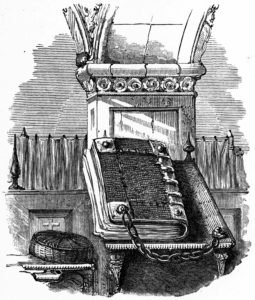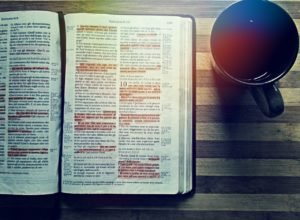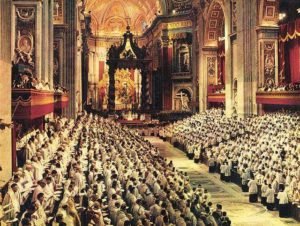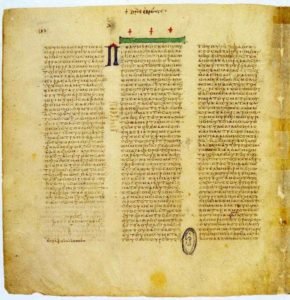 A claim that I’ve often heard made by anti-Catholics is that “Catholics cannot intepret Scripture for themselves, but must submit to the Catholic magisterium.” The claim is that the Catholic faithful cannot, are not able, or especially are not allowed to read and interpret the Bible for themselves, but are bound and constrained in every way to submit to the magisterium of the Church, to give up their very free will and intellectual judgment — in other words, that “the Bible is still chained,” that Catholics do not enjoy the freedom that Protestants have in “sola scriptura” to read, interpret, believe, and base their faith on the Word of God contained in the written word of Scripture.
A claim that I’ve often heard made by anti-Catholics is that “Catholics cannot intepret Scripture for themselves, but must submit to the Catholic magisterium.” The claim is that the Catholic faithful cannot, are not able, or especially are not allowed to read and interpret the Bible for themselves, but are bound and constrained in every way to submit to the magisterium of the Church, to give up their very free will and intellectual judgment — in other words, that “the Bible is still chained,” that Catholics do not enjoy the freedom that Protestants have in “sola scriptura” to read, interpret, believe, and base their faith on the Word of God contained in the written word of Scripture.
I’ve particularly heard this claim made by “former Catholics” who claim to be in the know, and it is usually presented with authoritative quotations from the teachings of various Church councils or statements of theologians, that appear, taken out of context and without a proper understanding of technical terms and distinctions, to forbid Catholics from reading and benefiting from Scripture on their own. This claim is specious and empty.

(Source: peachknee on Pixabay)
As I have written before, this claim, in substance, is the very same as the chief objection I myself had to the Catholic Church when I was a Protestant: that Catholics could not read and interpret Scripture for themselves, but must submit their understanding of Scripture to the magisterium of the Church. As a Protestant, I felt a closely-held prerogative to interpret Scripture for myself, in order to discern against false doctrines and false teachers, and even more, to engage in an intellectual communion with the Holy Spirit, the true interpreter of Scripture, through which God could lead me and guide me to the truth of His will, not only in matters of doctrine but in my everyday life. When I first heard the claims of the Catholic Church, that “the sole authentic interpreter of Scripture is the magisterium of the Church,” I felt viscerally threatened, that the Catholic Church sought to strip away and deprive me of my freedom as a Christian and a vital part of my relationship with God.
When I finally was faced with the truth of the Catholic Church, this was the first of my objections to fall. How that happened is a story I have told before. This post specifically examines the claim itself and the sources used to support it, why it is misleading, and why it is ultimately untrue.
The “Sole Authentic Interpreter”
The first time I ever encountered the threatening idea that the magisterium of the Church was the only authentic interpreter of Scripture, it was no doubt a form of a quotation from the Second Vatican Council document Dei Verbum (quoted in the Catechism of the Catholic Church at CCC 85 and 100):The task of authentically interpreting the Word of God, whether written or handed on, has been entrusted exclusively to the living magisterium of the Church, whose authority is exercised in the name of Jesus Christ (Second Vatican Council, Dogmatic Constitution on Divine Revelation Dei Verbum [November 18, 1965] 10.2).
The most threatening word of this statement is exclusively: all others, presumably, are excluded from the task of interpreting, including, naturally, lay Catholics.
But who or what is the magisterium? The Catechism at CCC 85 offers a slightly different translation of the statement, and includes by way of explanation:
“The task of giving an authentic interpretation of the Word of God, whether in its written form or in the form of Tradition, has been entrusted to the living teaching office of the Church alone. Its authority in this matter is exercised in the name of Jesus Christ” (DV 10 § 2). This means that the task of interpretation has been entrusted to the bishops in communion with the successor of Peter, the Bishop of Rome.
So it’s the pope and bishops who have taken away my right to interpret the Word of God! I found this, if possible, even more threatening.
But the operative word of the whole statement is authentic or authentically. To untrained ears, this may sound to be a mere synonym to truthfully, really, genuinely — that is to say, only the magisterium of the Church can offer a legitimate interpretation, and all others are necessarily illegitimate — but here, authentic is actually a technical term. It means that only the teachings of the magisterium can be held, in a legal, dogmatic sense, to be authenticated; only they can be held, in matters of dispute, to be an absolutely verified and authoritative statement.
This does not, in any way, bar anyone, Catholics or Protestants or secular scholars, from interpreting Scripture on their own, or from those interpretations being legitimate or true. The very text from which this quote is taken goes on demonstrate otherwise.
All Catholics are Taught and Exhorted to Read and Interpret Scripture

(Source: mnplatypus on Pixabay)
The interpreter of Sacred Scripture, in order to see clearly what God wanted to communicate to us, should carefully investigate what meaning the sacred writers really intended, and what God wanted to manifest by means of their words. … But, since Holy Scripture must be read and interpreted in the sacred Spirit in which it was written, no less serious attention must be given to the content and unity of the whole of Scripture if the meaning of the sacred texts is to be correctly worked out. (Dei Verbum 11, 12, cf. CCC 109-114).
These words are written not to the pope and bishops (the magisterium talking to itself?), but to all Christians. No Catholic is barred from reading or interpreting Scripture, but all Christians are encouraged and expected to:
“And such is the force and power of the Word of God that it can serve the Church as her support and vigor, and the children of the Church as strength for their faith, food for the soul, and a pure and lasting fount of spiritual life” (DV 21). Hence “access to Sacred Scripture ought to be open wide to the Christian faithful” (DV 22).
The Church “forcefully and specifically exhorts all the Christian faithful… to learn the surpassing knowledge of Jesus Christ, by frequent reading of the divine Scriptures. Ignorance of the Scriptures is ignorance of Christ” (DV 25).
(CCC 131, 133)
The fact that lay Catholics are able and encouraged to interpet Scripture, not only with the approval but with the praise of the Church, is plainly evident by the numerous Catholic books written by lay Catholics on Catholic biblical interpretation, commentary, theology, some of my favorite authors being Scott Hahn, one of the most respected biblical theologians in the Catholic Church today and a layperson, a convert from Presbyterianism; and Michael Barber and Brant Pitre, likewise eminent Catholic biblical scholars and professors and laypeople.
“Subject to the Judgment of the Church”
I know well the objections: If the magisterium of the Church is the only, “sole authentic interpreter” of Scripture, what does that even mean for lay Catholics? I’ve explained the technical sense of “authentic” here, but what else is there?Yes, lay Catholics, and all Christians, can legitimately and even truly interpret Scripture on their own. Understanding Scripture correctly, of course, involves “carefully investigating the meaning,” considering the “content and unity of the whole of Scripture,” and all the rest — advice that even Protestant exegetes gladly accept and encourage. Even the Reformed Westminster Confession of Faith encourages, for example, the use of “ordinary means” in arriving at a sufficient understanding of Scripture (WCF 7).
But the section of Dei Verbum on interpretation, quoted above, includes the caveat:
For all of what has been said about the way of interpreting, Scripture is subject finally to the judgment of the Church, which carries out the divine commission and ministry of guarding and interpreting the Word of God (DV 12).
What does it mean for Scripture to be “subject finally to the judgment of the Church”? It means, basically, that in matters of dispute, there is a final arbiter of interpretation, the magisterium of the Church. It means that while for Protestants, there is ultimately no final authority higher than one’s individual intellect and conscience in personally interpreting Scripture, resulting in endless disputes over proper doctrine and eventually the fragmentation of churches and denominations, Catholics do have a final authority in interpreting Scripture, an authoritative answer to doctrinal disputes and questions. Protestants may reject the claims of the Catholic Church to have such an authority — and here is not the place to discuss these claims at length; I have written much about them elsewhere — but the fact is that scriptural interpretation being “subject to the judgment of the Church” does not mean that Catholics are forbidden to interpet Scripture for themselves, but merely that they have a teacher and guide in doing so.
Reading with the Magisterium
One argument I’ve heard before claims that any interpretation of Scripture by a Catholic layperson is by definition contrary to the Church — that because the magisterium claims the right of being “authentic interpreter,” the Catholic layperson has no rights to interpret Scripture for himself at all, but instead must punctiliously submit his every thought to the literal dictations of the magisterium — that there is supposedly a compendium of magisterial scriptural interpretations that every Catholic exegesis must be compared with and must agree with. In fact, no such compendium exists; the “authentic interpretations” of the magisterium are contained in Catholic doctrine itself, as taught by the ecumenical councils of the Church and by the popes.
Truthfully, these “authentic interpretations” of the magisterium speak specifically to only a subset of Scripture, specifically to those Scriptures that form the basis of doctrine taught by the Church and to those about which there has been substantial dispute. For all the rest of Scripture, the reader is left, allowed, and encouraged to read and interpret for himself, in accord with the mind and sense of the Church.
A Teacher, Not a Tyrant
The magisterium of the Church is a teacher, not a tyrant. That is in fact what magisterium means. The interpretations of the Scripture that the Church offers are not arbitrary dictations of doctrine, contrary to the word and sense of the text, but teachings supported by extensive scholarship both into the scriptural texts, and into the contexts in which they were written and received. They are upheld by the understandings and interpretations of the earliest Christians, demonstrated in the testimony of the Church Fathers. Nothing the Church teaches regarding Scripture is new or baseless, but all can be found, in one form or another, in the deposit of faith, the teaching received from Christ and the Apostles, from the very beginning.
To submit to the magisterium of the Church is not to give up one’s freedom as a Christian, but it is to embrace the humility of a student, to listen to the teachers whom Christ entrusted the authority to teach us (e.g. 1 Timothy 4:13, 5:17, Titus 2:1). We have perfect freedom, ability, and license to read and interpret Scripture for ourselves, so long as we do so in accord with the teachings of the Church. Truth be told, no person, Catholic, Protestant, or otherwise, is free from this constraint: being part of a communion of faith involves being “of the same mind and judgment” with those with which one is associated; if a Christian decides he has a different interpretation of Scripture than the teachings of his church, then he may choose to depart from that church. This is the very foundation of Protestantism and of denominationalism. Indeed, the only person who is truly “free” to read and interpret Scripture entirely on his own, apart from agreement with any other Christians, is the one who denies all fellowship with the Body of believers, and who is perhaps the founder of a new religion.




